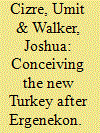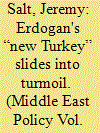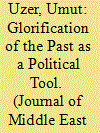|
|
|
Sort Order |
|
|
|
Items / Page
|
|
|
|
|
|
|
| Srl | Item |
| 1 |
ID:
095389


|
|
|
|
|
| Publication |
2010.
|
| Summary/Abstract |
In Turkey, a politically autonomous and secular military is pitted against a popularly elected, Islamic-rooted government, which has acquired new energy for domestic and foreign policy agendas and political reform. The election of Barack Obama and the Democrats in the US, as well as reverberations from the ongoing Ergenekon revelations and attempts to address the Kurdish question have brought new influences and players into the game of domestic Turkish politics. This article analyses the possible impact of these changes domestically, as well as from the EU and US perspectives.
|
|
|
|
|
|
|
|
|
|
|
|
|
|
|
|
| 2 |
ID:
145576


|
|
|
| 3 |
ID:
163738


|
|
|
|
|
| Summary/Abstract |
Turkey’s radical transformation of state and society under Mustafa Kemal Atatürk’s republican rule (1923–1938) has been subject to a gradual revision under the Justice and Development Party (AKP) government since 2002. The creation of a new state identity has been buttressed with Islamic and Ottoman discourses, which entail a reinterpretation of Ottoman history. This study analyzes the changes in modern Turkey in the last sixteen years within the context of the use of the Ottoman past in the formation of a new national identity by the AKP government.
|
|
|
|
|
|
|
|
|
|
|
|
|
|
|
|
| 4 |
ID:
142159


|
|
|
|
|
| Summary/Abstract |
In 1908, the Ottoman Third Army marched from Macedonia to Istanbul and forced the sultan to restore the constitution, introduced in 1876 and suspended in 1878 under the duress of war with Russia. In 1909, chanting crowds of religious students (softas) and turbaned clerics, along with disaffected soldiers, swarmed through the streets of Istanbul, demanding an end to constitutional government and the introduction of sharia law. Revolution had been followed by a counterrevolution, but the army struck back and sent the sultan into exile. Dervis Vahdeti, head of the Muhammadan Society and publisher of the newspaper Volkan (Volcano), was hanged — along with many others — for his central role in instigating the uprising. In 1923, the revolution was consolidated with the establishment of the Turkish Republic. It took shape according to the vision of its founder, Mustafa Kemal “Ataturk,” and thus was modernizing and secular, confining religion to the mosque and the home, and emancipating women. The state was also one-party and authoritarian, driving political Islam and Kurdish identity underground, only for them to rise to the surface again decades later.
|
|
|
|
|
|
|
|
|
|
|
|
|
|
|
|
| 5 |
ID:
159242


|
|
|
|
|
| Summary/Abstract |
Following the AKP’s second election victory in 2007, significant changes to the party programme and strategy evolved into the ‘New Turkey,’ a new, more abstractly defined discursive and operational space. This both redefined democratic practices and generated a backlash to gender equality and the status of women. As media is a powerful hegemonic tool, where political actors compete for influence, analysis of television daytime talk shows reflects similar gender role-making processes within Turkish society. We study one of the most popular shows in Turkey, hosted by Seda Sayan through ‘discursive governance’ and in which political actor discourses influence the public agenda through active sense-making, a process in which the media plays a critical disseminating and legitimating role, particularly in restrictive political settings. We argue that the show (now no longer broadcast) was a locus of discursive governance. Identity and habitus in the ‘New Turkey’ discourse strategically were projected in such shows, rendering formal policy change to affect behavioral shifts unnecessary. Seda Sayan’s show thus expressed a conservative and gendered public normative narrative, one that the AKP government has developed into a dominant normative order.
|
|
|
|
|
|
|
|
|
|
|
|
|
|
|
|
|
|
|
|
|